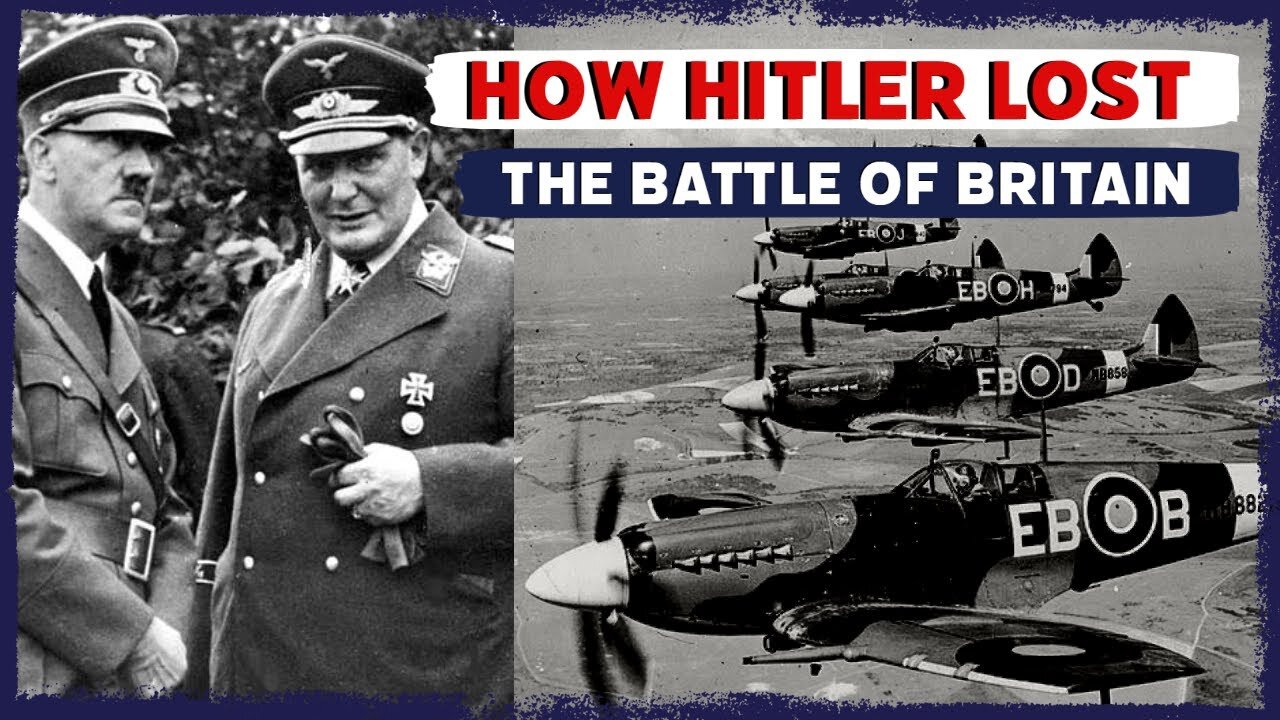Premium Only Content

The REAL REASON Hitler Lost The Battle Of Britain
The Battle of Britain (10 Jul 1940 – 31 Oct 1940) was a military campaign of World War Two in which the Royal Air Force and the Air Arm of the Navy defended the UK against attacks by the Nazi Luftwaffe.
In this video we examine the primary reasons for the UK's success in repelling fascism from their shores, an event which dealt Adolf Hitler his first decisive defeat in Europe responsible for fundamentally tipping the war in the Allies favour.
Thanks for watching!
SCRIPT:
From the Soviet’s victory in Moscow and Stalingrad, to the British Canadian triumph in the Battle of Atlantic needed to facilitate D-Day, World War Two had no shortage of key events instrumental in turning the tide against Nazi Germany.
However, there is one such moment that stands above the rest, one which would deal the first decisive blow against the advance of fascism.
This destined opposition to Hitler came from none other than the plucky island of Great Britain.
With the UK standing near-alone as one of the few remaining bastions of democracy in Europe, the Battle of Britain commenced July 10th 1940.
Facing what was then viewed by many as insurmountable odds against the Luftwaffe larger fleet at the start of the campaign on July 10th 1940, the Germans air force outnumbering the RAF 2 to 1, key factors would determine British triumph.
Owing to the battle being fought entirely in the sky, the superior British fighter-planes unquestionably aided the fight for aerial superiority, (BREATH) the quintessential being the highly manoeuvrable Spitfire and iconic Hawker Hurricane.
Additionally, by nature of being the defensive force British pilots greatly benefited from fighting over their own territory, the valour and legendary heroics of the airmen undoubtedly fuelled by the existential threat facing their homeland.
However, British grit and determination alone would’ve never guaranteed their victory.
Instead, and of far greater significance, the invention of radar technology by Robert Watson-Watt would be the real pivotal factor in combating the Nazi’s quest for aerial superiority.
Entering service in 1938 under the code name Chain Home, the British had now gained an implicit advantage over the Lufftwaffen as the first ever adopter of an early warning radar network.
The Dowding System, named after Commander Hugh Dowding, would incorporate this breakthrough technology into the nation's land-line telephone network, responsible for rapidly disseminating information on enemy positions.
The operation rooms also directed other defence systems, including anti-aircraft guns and barrage balloons.
This combination of a unified defence system utilising the very best of innovation unbeknownst to the Germans provided crucial mapping of incoming raids.
As a result, The Dowding system and radar increased the air forces average rate of success in intercepting Luftwaffe raids to 90%, providing a truly remarkable leap from the 30 to 50% considered excellent in the pre-war period.
This ability to know German whereabouts had thus provided a substantial multiplying effect, providing the RAF with an effective force of a fleet three times their size, a factor which would play vital for defeating the frequently larger Lufftwaffen forces.
Collectively, Fighter Command had been able to successfully manage their limited resources and remain in the fight, (breath) a detail crucial to the air forces survival in August during the major Luftwaffe bombing offensive of British airfields, code-named ‘Eagle Attack’.
In reality however, it would be Hitler’s ill-fated reaction to Churchill’s bombing of Berlin that tipped the balance in favour of the British.
Ordered by the Prime Minister on August 25th the bombing of Berlin would be a direct retaliation to the Luftwaffen’s accidental bombing of London the previous day after bombers had missed their military targets outside of the city, an incident which went against Hitlers orders to not target civilians.
With the Fuhrer incensed, worsened by the fact Luftwaffen commander Goring had promised the ability of the British to penetrate the fatherland as an impossibility, Hitler thereafter instructed all future attacks should instead target UK cities.
In his speech at the Sportsplast September 4th 1940, dramatised in the 1969 film Battle of Britain,
Known as the Blitz, the Luftwaffen began this shift in strategy on September 7th 1940, prioritising the area bombing of major British cities over RAF bases.
Of critical error by Nazi leadership, their decision to re-direct the Luftwaffen away from RAF airfields allowed bomber command to rebuild and regroup, greatly stepping up aircraft production during the Blitz campaign that inevitably led to the British re-claiming aerial superiority.
By October 31st, 3 months, and 3 weeks after the launch of the Luftwaffens aerial campaign, the Battle of Britain had come to an end, the British victory dealing the Nazis their first ever decisive defeat.
-
 LIVE
LIVE
Akademiks
43 minutes agoWar in RAT-LANTA. Young Thug vs Gunna vs Ralo vs YSL MONDO. Who Will Le Bebe Pick. FINAL CRASHOUT!
1,586 watching -
 59:29
59:29
The Charlie Kirk Show
1 hour agoTHOUGHTCRIME Ep. 96 — The Great Flag Burning Debate
5.47K5 -
 LIVE
LIVE
The Mel K Show
1 hour agoMel K & General Mike Flynn | Betrayal of a Nation: Soros’ NATO World Order | 8-28-25
995 watching -
 1:32
1:32
Gaming on Rumble
8 hours agoWhat is the Rumble Creator Program?!?! | Lvl UP
903 -
 LIVE
LIVE
Joker Effect
7 minutes agoInterviewing BEN JAMMINS! A personality with over 1 BILLION gif views. Let's give him a warm welcome
113 watching -
 11:37
11:37
Robbi On The Record
6 hours agoThe Devil is in the Branding..
603 -
 LIVE
LIVE
Savanah Hernandez
2 hours agoWhy Gen-Z Is So Radicalized Against Immigration
199 watching -
 LIVE
LIVE
megimu32
1 hour agoOTS: From A-List to MIA! 90s & 2000s Stars Who Vanished
102 watching -
 LIVE
LIVE
TinyPandaface
1 hour agoYour FACE Is A Gaming Channel! | Super Smash Bros w/ THE FELLAS!
89 watching -
 LIVE
LIVE
Flex011
2 hours agoMETAL GEAR SOLID : SNAKE EATER
28 watching